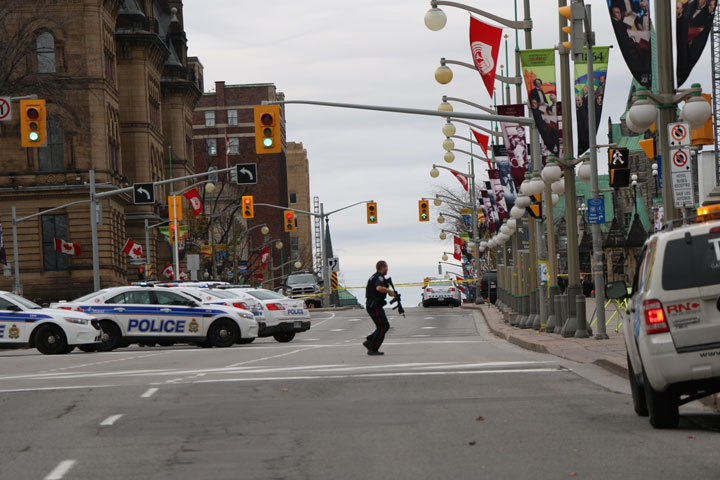Canada is “getting it wrong” in its war on terror, enacting laws that are both unconstitutional and fail to keep the country safer, an upcoming book charges.

False Security: The radicalisation of Canadian Anti-terrorism, by the University of Ottawa’s Craig Forcese and the University of Toronto’s Kent Roach, takes on Bill C-51, an anti-terror bill passed earlier this year.
The bill, ostensibly designed to address a pair of fatal attacks in Canada last fall, now faces a court challenge alleging it’s unconstitutional and violates Canada’s Charter of Rights and Freedoms.
“The government chose national security as a political wedge issue with an eye on an upcoming election,” the preface reads.
“Complex issues were, on both sides, too often reduced to slogans and talking points.”
In addition to violating Canadians rights and freedoms, Forcese said, the anti-terror law could simply make Canadians less safe — both by ignoring security inadequacies that have already been flagged, such as the communications breakdown that precipitated the Air India bombing, and by potentially perpetuating radicalization.
In promoting its anti-terror laws the federal Conservatives have repeatedly referred to “jihadi terrorists” that have “declared war” on Canada, despite calls from the Muslim community and advice from the RCMP that this hurts more than it helps.
READ MORE: On terror rhetoric, Public Safety Minister ignores RCMP and his own advisors
“You need a counternarrative,” Forcese said. “It’s not useful to have a discourse, coming from the PM, that talks about a war with violent jihadis. …
“You’re rewarding the usurpation of a term that has religious significance by violent extremists whose use of that word is contested by co-religionists.”
At the same time, Forcese said, even the information-sharing portions of the bill don’t oblige Canada’s spy agency CSIS to share information about imminent attacks.
“It basically tries to put wallpaper over a system of information-sharing that is a fissured wall. … The wallpaper doesn’t fix the cracks,” he said.
“No one is compelling CSIS to share its information.”
Both authors consulted the plaintiffs in the C-51 constitutional challenge, the Canadian Civil Liberties Association and Canadian Journalists for Freedom of Expression. Forcese said he’d be “shocked” if a court upholds the entire bill.
The book is scheduled to be published Sept. 18. The timing, coming in the middle of a months-long federal election campaign, is no mistake.
“We intended to be part of the discussion,” Forcese said. But he said he and Roach are non-partisan, not neutral.
“At the end of the election we’re going to have a government. And that government, no matter what its stripe, is going to confront an unfinished antiterrorism reform agenda.”
NDP leader Tom Mulcair has said he’d repeal C-51, but hasn’t said what he’d replace it with. Liberal leader Justin Trudeau has come under fire for supporting C-51 despite his reservations while promising to change it if he’s elected, a stance he admitted was “naive.”
WATCH: Trudeau debates C-51 protesters
It’s not enough to either stay the course or repeal C-51 altogether, Forcese said.
“C-51 is a tragedy,” he said.
“It will be proved ineffective and we will be back 10 years from now … trying to find solutions to the same problems.”
Conservative spokesperson Stephen Lecce defended the government’s anti-terror record in an emailed statement:
“Jihadi terrorists have targeted Canada and Canadians by name. Prime Minister Harper is acting to ensure our police have the tools they need to protect Canadians against jihadi terrorists,” he wrote.
“We cannot protect Canada or our communities by simply choosing to ignore this threat or sitting on the sidelines as proposed by Justin and Thomas Mulcair. Canadians understand that their freedom and security go hand in hand. Canadians expect us to protect both, and there are safeguards in this legislation to do exactly that.”




Comments